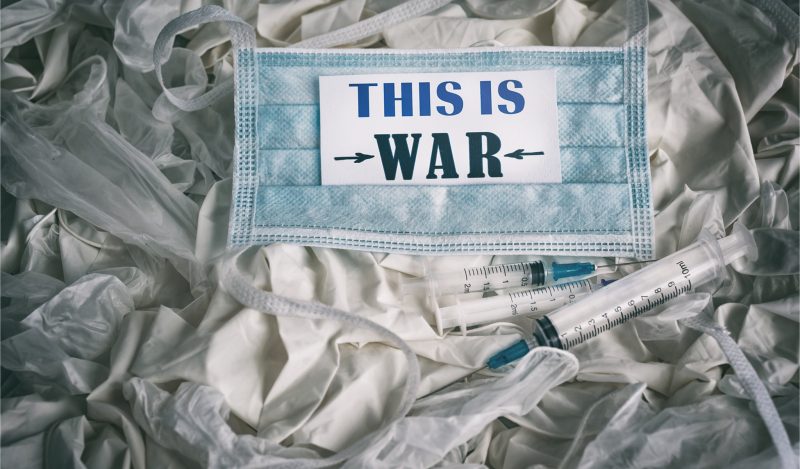A number of people have said it, but — and I feel it, actually: I’m a wartime president. This is a war. This is a war. A different kind of war than we’ve ever had. ~ Donald Trump, Former President of the United States
We are at war. All the action of the government and of Parliament must now be turned toward the fight against the epidemic, day and night. Nothing can divert us. ~ Emmanuel Macron, President of France
This war – because it is a real war – has been going on for a month, it started after European neighbors, and for this reason, it could take longer to reach the peak of its expression. ~ Marcelo Rebelo de Sousa, President of Portugal
We are at war with a virus – and not winning it. ~ Antonio Guterres, UN Secretary General
We must act like any wartime government and do whatever it takes to support our economy. ~ Boris Johnson, Prime Minister of the United Kingdom
The president said this is a war. I agree with that. This is a war. Then let’s act that way, and let’s act that way now. ~ Andrew Cuomo, Former Governor of New York
You get the picture. Leaders at the start of the COVID-19 pandemic really wanted us to think of ourselves as combatants possessing a civic duty to fight an insidious, unseen enemy. They wanted us to think that victory was possible. They wanted us to understand that there would be casualties, and collateral damage, and to steel ourselves for the inevitable enactment of broad and unfocused policies that would keep us safe, no matter the cost.
This isn’t all that surprising in hindsight. Politicians love to use war as a metaphor for just about every collective enterprise: the war on drugs, the war on poverty, the war on cancer. They understand that war provides an incomparable motivation for people to make sacrifices for the greater good of their countries, and when they want to harness some of that motivation, they pull out all the metaphorical stops.
Leaders have been searching for a “moral equivalent of war” for a very long time. The idea was introduced by psychologist and philosopher William James in a speech at Stanford in 1906 that has been credited for inspiring the creation of national projects such as the Peace Corps and Americorps, both organizations aspiring to “enlist” young people into meaningful, non-military service to their country:
I spoke of the “moral equivalent” of war. So far, war has been the only force that can discipline a whole community, and until an equivalent discipline is organized, I believe that war must have its way. But I have no serious doubt that the ordinary prides and shames of social man, once developed to a certain intensity, are capable of organizing such a moral equivalent as I have sketched, or some other just as effective for preserving manliness of type. It is but a question of time, of skillful propagandism, and of opinion-making men seizing historic opportunities.
People are willing to do things during a war that they wouldn’t be willing to do during peacetime. During World War II, it was impossible that German bombers would reach the middle of the United States, yet citizens in the U.S. Midwest practiced blackouts to demonstrate their commitment to defeating an enemy they had in common with people far away. People that actually had to sit in the dark at night to be safe.
This was what leaders using war metaphors were asking from their citizens at the start of the pandemic:
The war metaphor also shows the need for everyone to mobilize and do their part on the home front. For many Americans, that means taking social distancing orders and hand washing recommendations seriously. For businesses, that means shifting resources toward stopping the outbreak, whether in terms of supplies or manpower.
However, it wasn’t just social distancing and handwashing—leaders were asking for cooperation for a complete lockdown, a complete suspension of normal life for a short, yet vague and undefined period of time. There was no thought to how this would actually stop a highly contagious virus, or how people would be expected to return to normal life when the virus hadn’t completely disappeared. There wasn’t a desire to mobilize the engines of democracy for war. Instead, there was a mandate to shut them down. Economic production wasn’t maximized, it was minimized.
I was skeptical of the ability of shutdowns to do much good from the beginning, and was very much afraid that panic and overreaction would have serious consequences. I didn’t use war metaphors because it never occurred to me that they would be in any way helpful. Yet when I advocated trying to minimize collateral damage by allowing people who were less vulnerable to severe disease to resume their lives, others criticized that I was for “surrendering to the virus”. The use of war metaphors wasn’t just limited to leaders, but had quickly spread to the broader population.
Some international leaders tried to resist the temptation to use war metaphors, but ultimately failed. After telling the Canadian House of Commons that the pandemic wasn’t a war, Canadian Prime Minister Justin Trudeau couldn’t resist: “The front line is everywhere. In our homes, in our hospitals and care centers, in our grocery stores and pharmacies, at our truck stops & gas stations. And the people who work in these places are our modern-day heroes.” Trudeau later also couldn’t resist using extreme measures normally reserved for wartime to quell a protest led by the very truck stop heroes he had once glorified.
War metaphors have their uses, as explained by sociologist Eunice Castro Seixas:
Indeed, the findings of this study show how, within the context of Covid-19, war metaphors were important in: preparing the population for hard times; showing compassion, concern and empathy; persuading the citizens to change their behavior, ensuring their acceptance of extraordinary rules, sacrifices; boosting national sentiments and resilience, and also in constructing enemies and shifting responsibility.
“Constructing enemies and shifting responsibility” would play an important role later on in the pandemic, when extreme and damaging measures didn’t work and politicians resorted to blaming their own citizens for failing to cooperate with damaging and unsustainable measures.
Some academics, like anthropologist Saiba Varma, warned that:
Analogising (sic) the pandemic to a war also creates consent for extraordinary security measures, because they are done for public health. Globally, coronavirus curfews are being used to mete out violence against marginalised (sic) people. From the history of emergencies, we know that exceptional violence can become permanent.
It was obvious that working class and poor individuals would be disproportionally harmed by draconian COVID measures, and that the wealthy, or Zoom class might actually benefit:
We have, for example, already witnessed how people in already quite privileged positions are the ones who have the ability to work from home, which means that they also have more potential to act according to health recommendations, while others run the risk of being dismissed from their work or of their businesses going bankrupt. Then, there are those in positions identified as socially important functions that cannot choose to avoid risks, particularly in the care sector, where the risk of infection is the largest and shortages of protective equipment exist. Last, not everyone has the resources that are required to participate in pandemic self-governance (knowledge of how and when to shop, having people who can help you, the hospital closest to you having enough respirators, etc.).
The authors to the above article, Katarina Nygren and Anna Olofsson, also commented on the criticism of “lax” pandemic response measures in Sweden, noting how the pandemic response in Sweden was vastly different from that of most other countries in Europe because it emphasized personal responsibility rather than relying on government coercion:
Thus, the Swedish strategy to manage Covid-19 has been largely based on the responsibility of the citizens who receive daily information and instructions for individually targeted self-protection techniques by the Public Health Agency of Sweden’s website and press conferences held by state epidemiologist Anders Tegnell, Prime Minister Stefan Löfven, and other representatives of the government. They continue to underline the importance of all citizens playing their part to stop the virus from spreading and avoiding the enhancement of law enforcement’s restrictions on citizens’ rights as long as possible.
With recommendations rather than prohibitions, the individual becomes the unit of decision making towards whom claims of liability are directed if he or she does not manage to act ethically according to social expectations. This kind of governing of conduct, which has been characteristic of the Swedish risk management strategy during the pandemic thus far, targets the self-regulating individual in terms of not only trust but also solidarity. This type of governing was explicitly made by the prime minister in his speech to the nation on the 22nd of March (speeches that are extremely rare in Sweden) in which he particularly emphasized individual responsibility not only for the sake of personal safety but for the sake of others.
The Swedish Prime Minister, Stefan Löfven, used precisely zero wartime metaphors in his March 22, 2020 speech to the nation about the COVID pandemic and the response of the Swedish government. Within the next few months, the Swedish response was, rather predictably, viciously attacked by other leaders and media outlets for its failure to conform to the rest of the reflexive lockdown-mandating world. Yet the Swedish strategy has overall not resulted in much higher deaths, currently 57th in COVID deaths per million inhabitants, well below many of its critics.
There were only a few other notable exceptions in the metaphorical blitzkrieg of war imagery by world leaders in their early pandemic speeches. Another was German President Frank-Walter Steinmeier, who said of the pandemic, “It is not a war. It is a test of our humanity!” The reluctance of a German leader to use a war metaphor for something that is clearly not a war is both understandable and admirable.
Brazilian President Jair Bolsonaro was contemptuous of lockdowns and refused to use war imagery in his speeches, making it quite clear that pandemic deaths had no easy collective solution, only hard choices: “Stop whining. How long are you going to keep crying about it? How much longer will you stay at home and close everything? No one can stand it anymore. We regret the deaths, again, but we need a solution.” Not surprisingly, he was widely condemned for these comments.
Interestingly, much of the analysis and criticism of the use of war metaphors for the early pandemic response came from left-leaning outlets, like Vox, CNN, and The Guardian, where journalist Marina Hyde wrote:
As the news gets more horrifyingly real each day – and somehow, at the same time, more unmanageably unreal – I’m not sure who this register of battle and victory and defeat truly aids. We don’t really require a metaphor to throw the horror of viral death into sharper relief: you have to think it’s bad enough already. Plague is a standalone horseman of the apocalypse – he doesn’t need to catch a ride with war. Equally, it’s probably unnecessary to rank something we keep being informed is virtually a war with things in the past that were literally wars.
An article in Vox warned of the consequences of too much power in the wrong hands:
A war metaphor can also have dark consequences. “If we look at history, during times of war, it’s often been the case that war is accompanied by abuses of medicine and the suspension of widespread ethical norms,” Keranen said, citing Nazi use of medicine or other public health trials that have been conducted on prisoners and war resistors over the years. “Especially now, we need to be on guard for this with the clinical trials and other product development that we’re undergoing, so that in our haste to ‘fight’ the disease with a military metaphor, we’re not giving away our fundamental ethical concepts and principles.”
“Giving away our fundamental ethical concepts and principles” is arguably exactly what happened in many western nations, yet hard-hitting and often accurate criticism from left-leaning media outlets speaking out against the pandemic as a war view had all but gone silent sometime after November 3rd, 2020. Coincidently, the conflation of a pandemic public health response with a military one has all but been erased by an actual war when Russia invaded Ukraine. An actual war tends to bring perspective back to places where it has been lost rather quickly.
With two full years of hindsight, it’s clear that lockdowns were a disaster and that mandated measures caused more harm than benefit, yet this has not prevented leaders from declaring victory, crediting their own brave and resolute leadership for saving millions of lives and routing the viral enemy. However, SARS-CoV-2 isn’t a real enemy—it doesn’t have an intention other than to exist and spread, and it won’t agree to an armistice. Instead, we will have to live with the virus forever in an endemic state, and skip the victory parades.
There’s no evidence that calling the pandemic what it truly was – a global natural disaster, admitting our limitations for “defeating” it, and calling on people to stay calm and avoid acting in irrational fear – would’ve resulted in a worse outcome. It’s more likely that the collateral damage of broad and unfocused responses would have been avoided in a pandemic-as-disaster scenario.
There would be no need to view leaders as military commanders or experts as heroes or high priests of absolute truth. Rather, the humble and rational response that Sweden’s leaders enacted and the proponents of the Great Barrington Declaration proposed will be remembered as the least damaging among many others that resulted in failure and defeat on the metaphorical battlefields of public health.
Republished from Substack
Published under a Creative Commons Attribution 4.0 International License
For reprints, please set the canonical link back to the original Brownstone Institute Article and Author.









